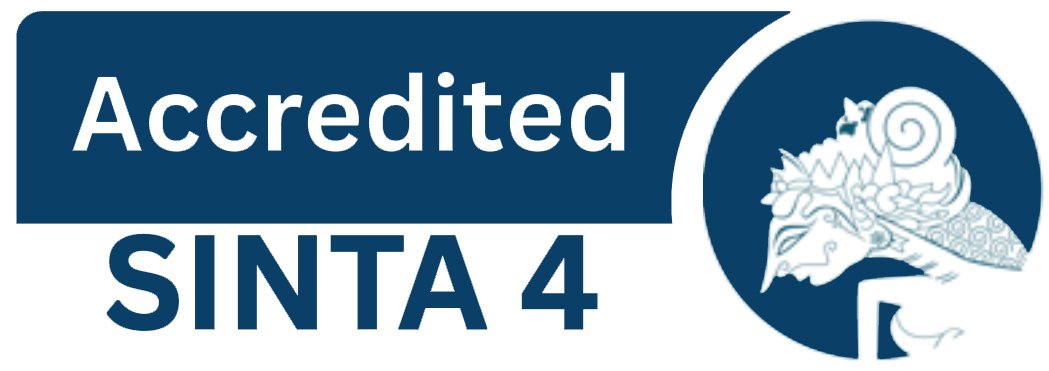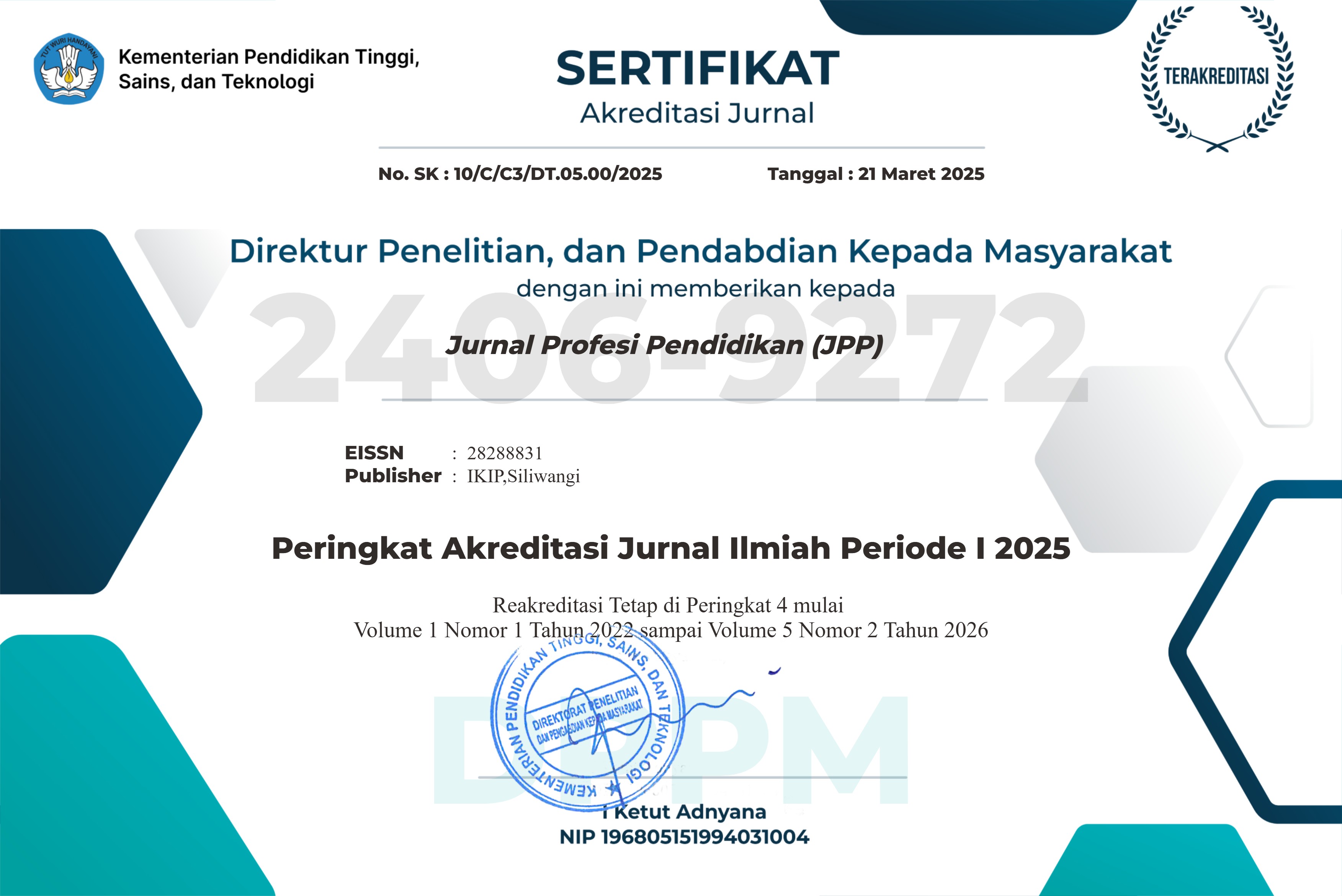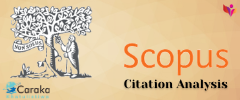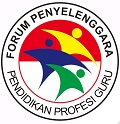The Effect of Ethnolinguistic-Based Experiential Learning Model on Critical Thinking Abilities of PGSD Students
DOI:
https://doi.org/10.22460/jpp.v4i1.27234Keywords:
Experiential Learning, Ethnolinguistics, Critical ThinkingAbstract
The low critical thinking ability of students needs serious attention. This study aims to determine the effect of ethnolinguistically-based experiential learning models on the essential thinking abilities of PGSD students. The research method used is a pre-experiment with a group pretest-posttest design. The population in this study was 6th-semester PGSD students at the Indonesian Education Institute. The sample taken was class 5B, totaling 33 people, with a purposive sample technique. The study yielded an average initial ability value of 79.3 and an increase in the posttest value to 84.18. The results of data analysis showed that the pretest-posttest t value was 0.8 with a probability of 0.00. Therefore, we can conclude that the ethnolinguistic-based experiential learning model influences students' critical thinking abilities.
References
Afandi & Sajdian. (2018). Stimulasi keterampilan berpikir tingkat tinggi. Surakarta: UNS Press
Afandi, Tulus, J., Rahmi, A. (2016). Implementasi digital-age literasi dalam pendidikan abad 21 di indonesia. Prosiding seminar nasional pendidikan sains: UNS Surakarta, p. 95-112
Agustin, M., Pratama, Y. A., Sopandi, W., & Rosidah, I. (2021). Pengaruh model pembelajaran radec terhadap keterampilan berpikir tingkat tinggi mahasiswa pgsd. Jurnal Cakrawala Pendas, 7(1). Https://doi.org/10.31949/jcp.v6i1.2672
Astuti, s. (2024). Peningkatan kemampuan berpikir kritis dan kompetensi mahasiswa pgsd menggunakan fitur f-learn assigment dan forum. Scholaria: Jurnal Pendidikan dan Kebudayaan, 14(2), 144-154.
Asyari, L., Nuriyanti, R., Gunawan, D., & Adiredja, R. K. (2021). The Influence of Experiential Learning Model on Primary School Student’s Creative Thinking Skills. In Social, Humanities, and Educational Studies (SHEs): Conference Series (Vol. 4, No. 1, pp. 70-76).
Ayunda, S. N., Lufri, L., & Alberida, H. (2023). Pengaruh model pembelajaran problem based learning (pbl) berbantuan lkpd terhadap kemampuan berpikir kritis peserta didik. Journal on Education, 5(2), 5000-5015.
Fitri, H., Dasna, W., & Dasar, P. (2018). Pengaruh model project based learning (pjbl) terhadap kemampuan berpikir tingkat tinggi ditinjau dari motivasi berprestasi siswa kelas iv sekolah dasar. Briliant: Jurnal Riset dan Konseptual, 3(2). Https://doi.org/10.28926/briliant
Kadek, I., Dwipayana, A., & Astawan, N. (2024). PEDALITRA IV : seminar nasional bahasa. 4(1).
Kolb, D. A. (2014). Experiential learning: experience as the source of learning and development. Ft Press.
Krishervina, O. :, Lidiawati, R., & Aurelia, T. (2023). Kemampuan berpikir kritis siswa di indonesia: rendah atau tinggi? Https://doi.org/10.15294/jpp.v35i1.13529
Masthura, S. D. (2017). Pengaruh penerapan model pembelajaran experiential dengan pemanfaatan media video compact disc pada tema makananku sehat dan bergizi terhadap peningkatan hasil belajar siswa di kelas IV min jantho aceh besar. Universitas Islam Negeri Ar-Raniry.
Meristin, A., & Supriatna, M. (2023.). Dwija cendekia: jurnal riset pedagogik from local wisdom to the classroom: integrating belangiran values for holistic elementary education.
Muhammad Noor Ahsin, Dan. (2019). Pengembangan model pembelajaran etnolinguistik berbasis nilai-nilai islam nusantara untuk mahasiswa pgsd. Http://jurnal.umk.ac.id/index.php/re
Nurhasanah, S., Malik, A., & Mulhayatiah, D. (2017). Penerapan model experiential learning untuk meningkatkan keterampilan berpikir kritis siswa. WAPFI (Wahana Pendidikan Fisika), 2(2), 58. Https://doi.org/10.17509/wapfi.v2i2.8280
Nurkarimah, N., & Gaffar, A. A. (2024). Experiential Learning dalam Meningkatkan Kemampuan Berpikir Kritis pada Siswa SMA. PEDAGOGI BIOLOGI, 2(2), 1-5.
Pratama, Y. A., Sopandi, W., Hidayah, y., & Trihatusti, M. (2020). Pengaruh model pembelajaran radec terhadap keterampilan berpikir tingkat tinggi siswa sekolah dasar. Jinop (jurnal inovasi pembelajaran), 6(2). Https://doi.org/10.22219/jinop.v6i2.12653
Riyanto, M., Asbari, M., & Latif, D. (2024). Efektivitas problem based learning terhadap kemampuan berpikir kritis mahasiswa. Journal of information systems and management, 03(01). Https://jisma.org
Satwika, Y. W., Laksmiwati, H., & Khoirunnisa, R. N. (2018). Penerapan model problem based learning untuk meningkatkan kemampuan berfikir kritis mahasiswa. Jurnal pendidikan (teori dan praktik), 3(1), 7. Https://doi.org/10.26740/jp.v3n1.p7-12
Susanti, T., murniasari, F., & Oryza, D. (2022). Model pembelajaran experiential learning “kemampuan berpikir kritis” peserta didik. Biodik, 9(1), 157–166. Https://doi.org/10.22437/bio.v9i1.21434
Syahrial, Agus Kurniawan, D., & Asrial. (2021). Ilmu dasar pembelajaran etnokontruktivisme. Media salim indonesia. Tersedia online: www.salimmedia.com
Tindakan, P., Kelompok, D., Mentari, D., & Selatan, K. B. (2014). Peningkatan kemampuan berpikir kritis melalui metode eksperimen berbasis lingkungan. Https://doi.org/10.21009/jpud.092
Downloads
Published
How to Cite
Issue
Section
License
Copyright (c) 2025 Risma Nuriyanti, Susilawati, Deceni Amelia, Abih Gumelar

This work is licensed under a Creative Commons Attribution-ShareAlike 4.0 International License.
Authors who publish with the Journal Pendidikan Profesi (JPP) agree to the following terms:
- Authors retain copyright and grant the journal the right of first publication with the work simultaneously licensed under a Creative Commons Attribution License (CC BY-SA 4.0) that allows others to share the work with an acknowledgment of the work's authorship and initial publication in this journal.
- Authors are able to enter into separate, additional contractual arrangements for the non-exclusive distribution of the journal's published version of the work (e.g., post it to an institutional repository or publish it in a book), with an acknowledgment of its initial publication in this journal.
- Authors are permitted and encouraged to post their work online (e.g., in institutional repositories or on their website) prior to and during the submission process, as it can lead to productive exchanges, as well as earlier and greater citation of published work. (See The Effect of Open Access)
Similar Articles
- Yanuar Rafindo, Puspa Dianti, Laili Linda Hartati, Application of ICT-Based Problem Based Learning Method as a Learning Innovation for Pancasila Education to Improve Learning Outcomes of Class VII D Students of SMPN 51 Palembang , Jurnal Profesi Pendidikan: Vol. 4 No. 1 (2025): June
- Oky Prayogi, Ryan Dwi Puspita, Implementation of Constructivism-Based Game-Based Learning Model in Science Learning for Grade IV , Jurnal Profesi Pendidikan: Vol. 4 No. 1 (2025): June
- Medita Ayu Wulandari, Anwar Senen, Duhita Savira Wardani, Siti Ruqoyyah, Transforming Education Through Project-Based Learning (PjBL): Enhancing Students' Learning Outcomes and Critical Thinking , Jurnal Profesi Pendidikan: Vol. 4 No. 1 (2025): June
- Kamilia Salsabila, Susanti Sufyadi, Agus Hadi Utama, Systematic Literature Review: The Utilization of the Edutainment Learning Model on Students’ Learning Motivation , Jurnal Profesi Pendidikan: Vol. 4 No. 1 (2025): June
- Mira Astria, Ryan Dwi Puspita, Application of Humanistic Theory Assisted by Deep Learning in Science Learning Grade 4 SDN 108/1 Sungai Rumbai , Jurnal Profesi Pendidikan: Vol. 4 No. 1 (2025): June
- Izzah Millati, Agustina Tyas Asri Hardini, Improving the Cooperation Attitude of Grade V Students Through the Application of Problem-Based Learning Model in Pancasila Education Subjects , Jurnal Profesi Pendidikan: Vol. 4 No. 1 (2025): June
- Julia Julia, Umi Chotimah, Tyas Masito Mutiara, Enhancing Learning Motivation of Grade XI.9 Students Through Zep Quiz Media in Civics Education at SMA Negeri 3 Palembang , Jurnal Profesi Pendidikan: Vol. 4 No. 1 (2025): June
- Enur Nurmawati, Meningkatkan Motivasi dan Hasil Belajar Matematika Peserta Didik Kelas VII Melalui Penerapan Model Pembelajaran Problem Based Learning , Jurnal Profesi Pendidikan: Vol. 3 No. 1 (2024): June
- Nuraini Nuraini, Camellia Camellia, Maimun Maimun, The Implementation of Culturally Responsive Teaching (CRT) Approach to Improve Learning Outcomes and Learning Motivation of Grade XI.3 Students at SMA Negeri 1 Palembang , Jurnal Profesi Pendidikan: Vol. 4 No. 1 (2025): June
- Luviani Sri Rezeki, Trisna Nugraha, Penggunaan Model Project Based Learning Berbasis Socio Scientific Issues untuk Meningkatkan Kemampuan Berpikir Kreatif Siswa Kelas IV Sekolah Dasar , Jurnal Profesi Pendidikan: Vol. 3 No. 2 (2024): December
You may also start an advanced similarity search for this article.

















